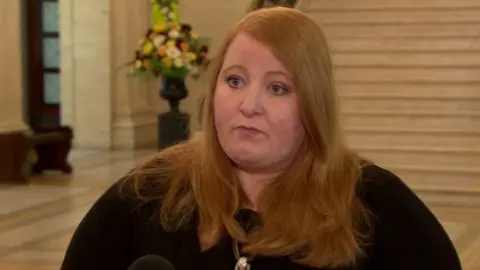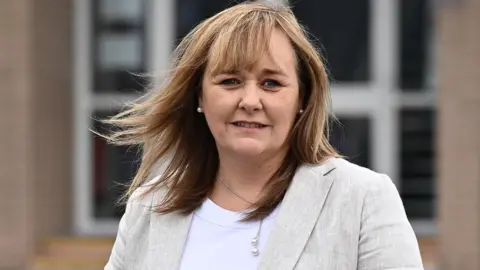Sinn Féin 'will not back new first minister without Irish law'
 PA Media
PA MediaSinn Féin has said it will not agree to a new DUP first minister without movement on Irish language legislation.
A stand-off has developed between the parties over language and culture law.
Following Arlene Foster's resignation, both parties must agree to a new first minister and deputy first minister.
But Sinn Féin has said it wants Irish language legislation passed, while the DUP will not commit to this before the next election.
The party told the UK government it should legislate for the Irish language through Westminster to resolve a Stormont split on the issue.
Party leader Mary Lou McDonald claimed the government offered to intervene weeks ago, but the party declined.
Democratic Unionist Party (DUP) MP Sammy Wilson said the government "must not interfere in devolved issues at the behest of Sinn Féin".
Following talks with the political parties on Tuesday, Northern Ireland Secretary Brandon Lewis tweeted that the people of Northern Ireland "deserve a stable, mature, functioning executive that is able to deliver in their best interests".
"They need to see that politics works and dialogue and debate delivers results," he said.
Earlier on Tuesday, speaking on the BBC's Good Morning Ulster programme, Sinn Féin MP Chris Hazzard was asked if his party would agree to the nomination of a new first minister if Westminster did not agree to put forward an Irish language act.
The South Down MP said: "No. There is simply no basis for power-sharing if we do not have movement on these issues."
He added: "The underlying fact in all of this is power-sharing doesn't work on broken promises."
 Niall Carson
Niall CarsonWhen Arlene Foster stood down as first minister on Monday, Sinn Féin's Michelle O'Neill also lost her position as deputy first minister because the roles are a joint office.
The DUP has nominated Paul Givan as Mrs Foster's replacement.
The parties have until Monday to approve new first and deputy first ministers, otherwise Northern Ireland Secretary Brandon Lewis will be obliged to call an election within a "reasonable time".
Mrs Foster said on Monday in her final statement as first minister that a deal on language and culture - struck in January 2020 - was the "only model for success".
'Engaged intensively'
After meeting Mr Lewis on Monday night, Ms McDonald said government intervention was the "only way forward to finally resolve" the dispute over Irish language legislation.
She said Sinn Féin had declined an earlier offer from the UK government to legislate at Westminster because its preference was for the matter to be dealt with at Stormont.
"We have engaged intensively with the DUP and with party leader Edwin Poots," said Ms McDonald.
 PA Media
PA Media"He has told us that they will not be delivering [an Irish language act] in this mandate.
"This legislation was negotiated a year-and-a-half ago and it is now incumbent on the British and Irish governments to act."
The 2020 deal as part of the New Decade, New Approach (NDNA) agreement, included an Office of Identity and Cultural Expression, an Irish language commissioner and a commissioner to enhance and develop the language and culture of the Ulster-Scots/Ulster-British tradition.
'Move on'
Alliance Party leader Naomi Long accused the DUP of refusing to show "any sort of compromise or ability to work with others".
"It's apparent that some parties now see this change of leadership in the DUP as an opportunity to renegotiate, reposition themselves and create a crisis where none is necessary," Mrs Long told the BBC's Good Morning Ulster programme.

"We all signed up to NDNA knowing that there were parts of that agreement that would be more difficult, would be more challenging, but we knew that it had to be done.
"All we need to do is move on, get the Irish language act underway, stop messing around and breaking promises and get on with the real business of government."
However, Mr Wilson, DUP chief whip at Westminster, said: "To force through the latest Sinn Féin wish list will cause further damage to the credibility of the Northern Ireland Assembly.
"Rather than running to Her Majesty's Government when they can't get their way, republicans should respect our mandate.
"Sinn Féin is playing the politics of ransom and are placing culture above health, education and economic recovery."
In July 2019, when Stormont was suspended, MPs at Westminster backed amendments to liberalise abortion and extend same-sex marriage to Northern Ireland.
Mr Wilson said this "only served to undermine devolution".
 Pacemaker
PacemakerDUP Education Minister Michelle McIlveen said she would not be "particularly happy" about the secretary of state intervening to pass Irish language legislation at Westminster.
Speaking during a visit to a school in Belfast - her first engagement since taking over the role - she accused Sinn Féin of prioritising Irish language commitments "above all else".
"This is a devolved matter - the secretary of state has gotten himself involved in previous issues but this is about the devolution package and how that's being respected," she added.


Explaining the latest developments in Northern Irish politics to people who live here is sometimes hard enough - never mind to people who don't
Sinn Féin's appeal to the British government to bypass Stormont and legislate for the Irish language directly is such a moment.
This from the party who warned against the introduction of direct rule for the three years Stormont was suspended is quite a move.
Pragmatism or hypocrisy? You decide and many will.
Even more astonishing is the claim that Westminster offered to do it weeks ago and Sinn Féin turned them down, believing it could be sorted at home.
The fact they've changed their minds shows that things between the party and the new DUP leadership could, shall we say, be better.
It's also a sure sign that Sinn Féin, no more than the DUP, want a collapse they would ship their fair share of blame for from an increasingly unforgiving public.
Another one for the pages of that still unwritten book "Stormont, you couldn't make it up".

'Absolutely not' a red line
Also speaking to Good Morning Ulster, SDLP leader Colum Eastwood said all of the NDNA commitments needed to be delivered "urgently", adding: "That includes the Irish language legislation, it includes other cultural legislation in the agreement."
However, Mr Eastwood said it would be "absolutely wrong" to bring the executive down over the issue.
Instead he said he and his fellow SDLP MP Claire Hanna would seek to legislate on the Irish language at Westminster.
He said if the DUP and Sinn Féin could not reach a solution he would attempt to amend a bill related to Northern Ireland that is currently making its way through the House of Commons
On Monday Mr Poots said "time will tell" whether the implementation of the deal would happen in the existing Northern Ireland Assembly term, which is due to expire in April 2022.
He added that it was not appropriate for Sinn Féin to set preconditions on nominating a first and deputy first minister.
"It's not respecting someone's mandate... I'm not setting preconditions to the selection of Sinn Fein's deputy first minister," he said.

How could Westminster step in?
The Northern Ireland Assembly has the power to make laws in any area that isn't "reserved" to Westminster.
Reserved matters include things such as defence, income tax and making foreign treaties.
Any matter that is not a reserved matter is devolved.
The Northern Ireland Act - which established the assembly - allows the NI secretary to make any devolved matter a reserved matter, or vice versa, using a legislative instrument known as an Order in Council.
However in the case of the language and cultural package agreed as part of the New Decade, New Approach deal in January 2020, it was specifically stated that the legislation would be established as new dedicated parts of the Northern Ireland Act.
This meant it was always going to require passage at Westminster at some stage of the process.
However it will still be up to Stormont to implement the legislation in practice.
